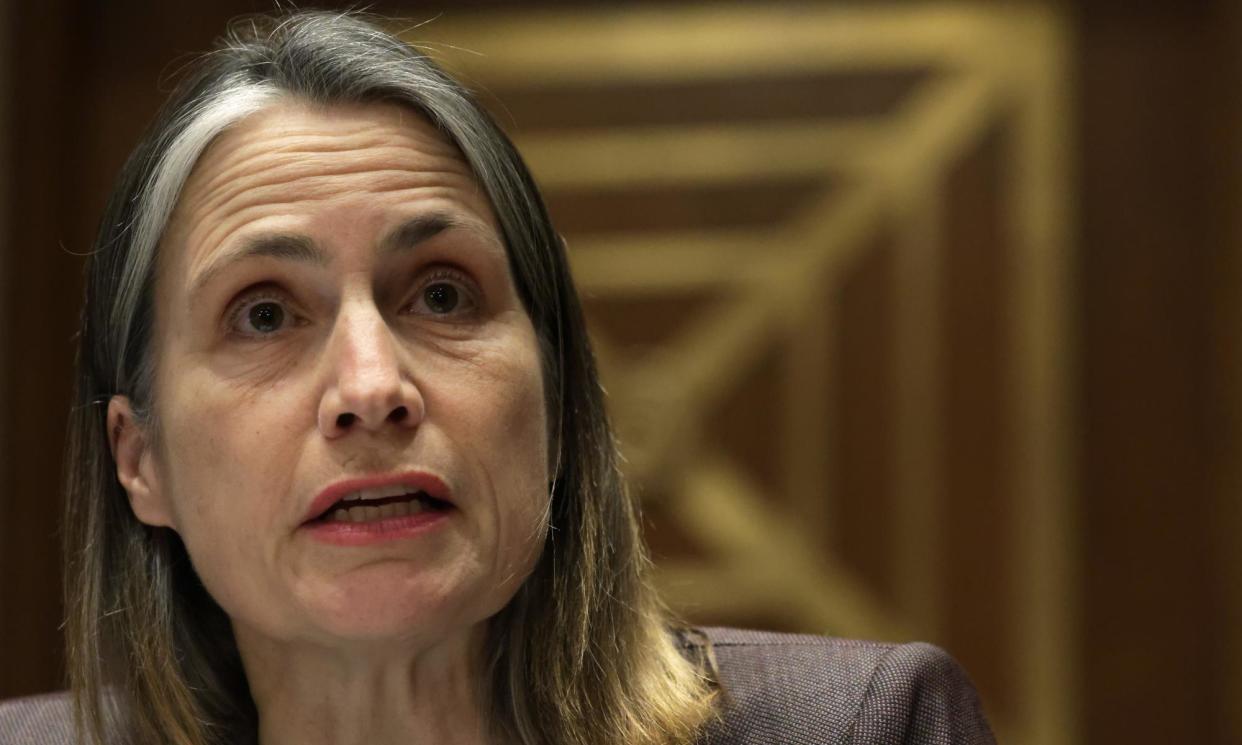Trump ‘would’ve lost mind completely’ if Putin admitted interference, Fiona Hill says

- Oops!Something went wrong.Please try again later.
- Oops!Something went wrong.Please try again later.
Donald Trump “would have lost his mind completely” at his summit with Vladimir Putin in Helsinki in 2018, the former White House Russia specialist Fiona Hill said, if the Russian president had simply admitted he did in fact interfere on Trump’s behalf in the US election two years before.
Related: CPAC: Noem and Stefanik lead charge of the wannabe Trump VPs
Trump, Hill said, refused “to believe that Russia tried to tip the scales to his benefit. And if Putin had actually said to him at some point, ‘No, Donald, I did try to interfere in the election,’ I think he would have lost his mind completely.
“Because what would he have done about that? He’s trying to push back against this and the conclusion of course is that no, Russia didn’t do that at all.”
Hill, a British-born academic and analyst now chancellor of Durham University, was a deputy assistant to the president in the Trump administration. She was speaking on Saturday at the Principles First Summit in Washington DC.
Counter-programming the pro-Trump Conservative Political Action Conference, or CPAC, taking place outside the city, Principles First offered a slate of anti-Trump voices.
Hill followed speakers including the philosopher Francis Fukuyama, the Bulwark editor Bill Kristol and Quin Hillyer, a columnist who called Joe Biden “a crooked brain-fogged old man who sold out to the radical left” – indicating the conservative roots of the conference.
Hill was asked about her experiences at the summit in Helsinki, when Trump caused huge controversy by meeting Putin alone then appearing deferential in public, saying he took the Russian president at his word that he did not interfere in the US election in 2016 – a conclusion not supported by US intelligence and law enforcement.
Hill has previously said she was so appalled that she considered faking a sudden illness to stop the press conference.
“I also thought about pulling the fire alarm, but I didn’t know what Finnish was for ‘fire alarm’,” Hill said, to laughter.
More seriously, Hill said, the Putin press conference “was one of the most humiliating episodes of all time.
“The actual meeting between Trump and Putin was, probably don’t take my word for it, much more sensible behind the scenes.”
Hill said Trump was “very focused on arms control issues”.
But, she said, “Putin always looked to put one over Trump and, actually, every leader he ever meets. Even Xi Jinping of China. Putin thinks about what people’s vulnerabilities are, and how he can then try to manipulate the conversation to go in his direction.
“The issue was really the press conference itself. We knew that it was going to be difficult. I’d actually recommended against a press conference. My word didn’t have much coinage in that environment but one of the reasons was because Trump admires Putin so much, he never wants to be humiliated. And it was all about a personal sense of humiliation.
“The instance in which he was asked the question about whether he felt that the Russians interfered in the election, he wanted to push back very quickly against it. He wanted to diminish any kind of idea of that because if … he wanted to get the message across that nobody had interfered on his behalf.”
Hill is a co-author of Mr Putin: Operative in the Kremlin, an early study of the Russian leader and his roots in Soviet intelligence.
Putin is set to stay in power until 2036. Trump is the probable Republican nominee for president this year, 91 criminal indictments and assorted civil judgments notwithstanding, and the driving force behind Republicans in Congress blocking further aid to Ukraine in its two-year fight against Russian invaders.
Trump, Hill said, “idolises” Putin, oblivious to Putin’s attempt to “erode the idea of the United States” as a democratic power.
Asked about the death last week of Alexei Navalny, Putin’s chief domestic opponent, and Trump reacting only by comparing himself to a man Putin is widely held to have killed, Hill said Trump might have been open to being critical had figures he admired done the same.
“Elon Musk actually saying something positive about Alexei Navalny at the time, extolling him as a hero, that could have changed Trump’s perception because it’s as capricious as that,” she said. “It’s really about how this affects him.”
Related: Putin ‘has Trump’s number’ and still sees him ‘as an asset’, says Fiona Hill
In office, Hill said, Trump “talked about taking out Bashar al-Assad, because Assad dropped chemical weapons on his watch and that reflected on perceptions of Trump – rather than on the United States. He wanted to take out [Iranian general] Qassem Suleimani, which we did, because [Iranian-backed strikes on US targets] were an affront to him on his watch. It reflected on him in some negative way.”
Saying she had just returned from the Munich security conference, Hill said European leaders she spoke to were considering how to deal Trump with again.
“In many conversations around the edges of the conference,” Hill said, “the prime ministers and presidents and foreign ministers and others … all know how capricious Trump is. And that’s really what they’re worried about, because it doesn’t matter how many people that they know who become secretary of state or secretary of defense, it comes down to Trump himself and the unpredictability of his personality,” she said.
“And the result is that they have started to lose faith in the United States. And it’s very distressing to hear.”

